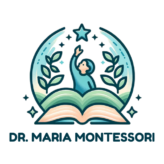Maria Montessori, born in 1870 in Chiaravalle, Italy, was a pioneering educator and the first woman to graduate in medicine from the University of Rome. Her innovative approach to education, known as the Montessori Method, revolutionized the way children are taught and has had a lasting impact on educational practices worldwide. This paper explores Montessori’s contributions to education, the core principles of her method, and her enduring legacy in contemporary educational theory and practice.
Early Contributions
Maria Montessori’s journey into education began with her work with children with special needs. In 1900, she was appointed as co-director of a new training institute for special education teachers in Rome. Her success in this role was notable; she developed new teaching methods and materials that enabled children with disabilities to achieve significant academic and personal growth. Montessori’s work with these children laid the foundation for her later educational innovations, highlighting the potential for all children to learn and grow when provided with the right environment and tools.
Development of the Montessori Method
In 1907, Montessori opened the first Casa dei Bambini (Children’s House) in the San Lorenzo district of Rome. This was a transformative moment in her career. In this setting, she observed children’s natural tendencies towards learning and experimentation, which led her to develop key educational principles that underpin the Montessori Method:
- Child-Centered Learning: Montessori believed that education should be tailored to the individual needs, interests, and developmental stages of each child. This principle emphasizes respecting the child’s autonomy and innate desire to learn.
- Prepared Environment: Montessori classrooms are meticulously designed to offer a wide range of learning materials and activities that children can choose from independently. The environment is structured to encourage exploration and discovery.
- Role of the Teacher: In the Montessori Method, the teacher acts as a guide or facilitator rather than a traditional instructor. The teacher’s role is to observe, support, and provide resources, allowing children to direct their own learning.
- Hands-On Learning: Montessori education emphasizes tactile and kinesthetic learning experiences. Children engage with materials that stimulate their senses and promote understanding through direct manipulation and experimentation.
- Mixed-Age Classrooms: Montessori classrooms typically group children of different ages together. This arrangement fosters peer learning, with older children often taking on mentoring roles and younger children benefiting from the guidance of their older peers.
Key Publications
Montessori’s ideas were disseminated through her numerous publications, which have become foundational texts in the field of early childhood education. Some of her most influential works include:
- “The Montessori Method” (1912): This book outlines the principles and practices of her educational approach, providing a comprehensive guide to her methods and philosophy.
- “The Absorbent Mind” (1949): In this work, Montessori delves into the nature of early childhood development, emphasizing the importance of the early years in shaping the human personality and intellect.
- “The Secret of Childhood” (1936): This book explores the psychological and developmental aspects of children, highlighting the innate potential and uniqueness of each child.
Global Influence
The Montessori Method quickly gained international recognition and was adopted by educators worldwide. By the 1920s, Montessori schools had been established in countries across Europe, North America, South America, and Asia. Montessori’s approach resonated with educators who were seeking alternatives to traditional, authoritarian models of education. Her method’s emphasis on respect for the child, individualized learning, and hands-on experiences provided a compelling framework that contrasted sharply with the rote memorization and rigid discipline prevalent in many schools of the time.
Enduring Legacy
Maria Montessori’s legacy is evident in the continued popularity and growth of Montessori schools around the world. Today, there are thousands of Montessori schools spanning every continent, serving children from infancy through adolescence. The principles she championed have also influenced mainstream educational practices and policies. Concepts such as differentiated instruction, the importance of early childhood education, and the role of the environment in learning are now widely recognized and implemented in various educational settings.
Impact on Contemporary Educational Theory
Montessori’s contributions have had a profound impact on contemporary educational theory. Her insights into child development have informed the work of subsequent educational theorists and practitioners. For example, her emphasis on the prepared environment and the role of sensory experiences in learning can be seen in the work of Jean Piaget and Lev Vygotsky, both of whom acknowledged the importance of active, hands-on learning in cognitive development.
Additionally, Montessori’s focus on fostering independence and self-motivation in children aligns with modern understandings of intrinsic motivation and self-regulated learning. Educational practices that promote student agency, such as project-based learning and inquiry-based instruction, reflect Montessori’s enduring influence.
Challenges and Criticisms
While Montessori’s methods have been widely praised, they have also faced criticism and challenges. Some educators argue that the Montessori approach can be too rigid in its adherence to specific materials and methods, potentially stifling creativity and adaptability. Others point out that implementing a Montessori program can be resource-intensive, requiring significant investment in materials and teacher training.
Despite these challenges, the core principles of Montessori education—respect for the child, the importance of a prepared environment, and the role of the teacher as a guide—continue to resonate with educators and parents seeking a holistic, child-centered approach to education.
Maria Montessori’s contributions to education have left an indelible mark on the field. Her innovative methods and profound insights into child development have transformed educational practices and continue to inspire educators around the world. The Montessori Method’s enduring relevance is a testament to the power of her vision and the effectiveness of her approach. As education evolves to meet the needs of the 21st century, the principles and practices pioneered by Maria Montessori will undoubtedly continue to play a vital role in shaping the future of learning.
